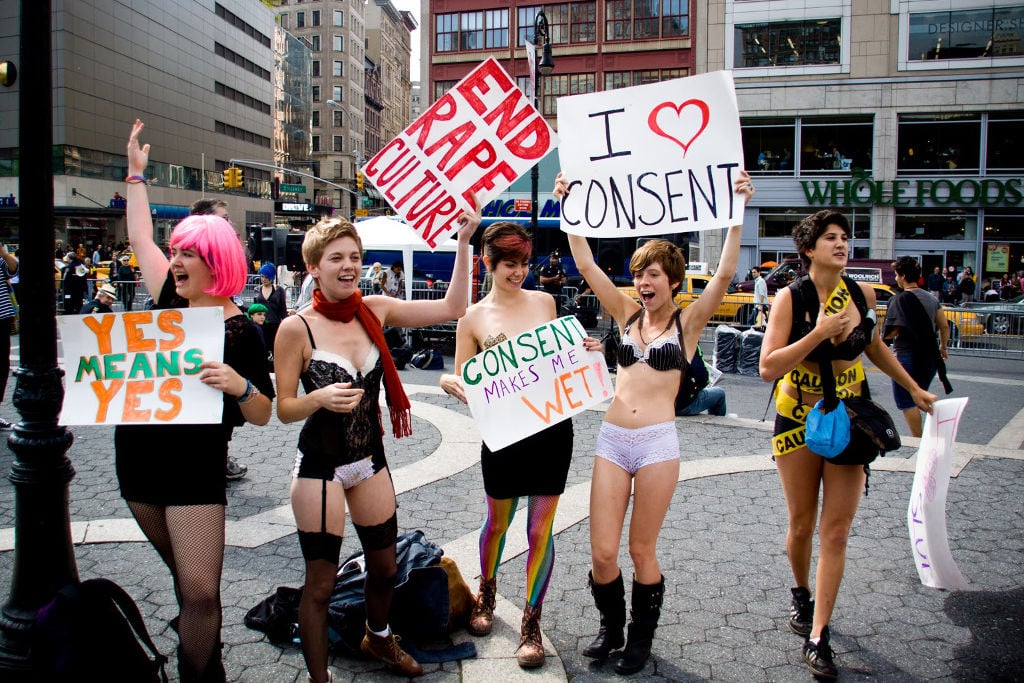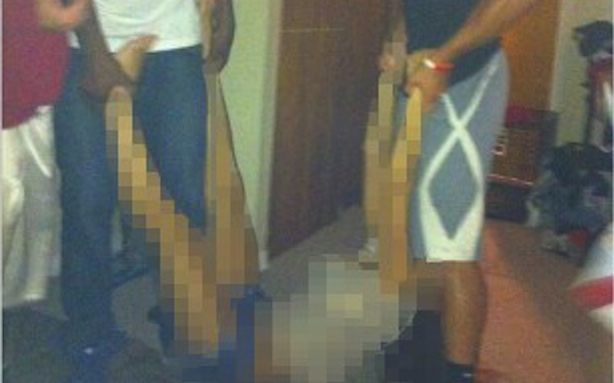Steubenville, John Laws And The Slut Shaming Endemic
Woman are being shamed for their sexual choices. They’re being shamed for identifying as feminists. Most alarmingly, they're being shamed for being victims of sexual abuse.

“My god, they were having a good time with you.”
Last week, radio shock jock John Laws questioned a victim of incest and sexual abuse about her powers of provocation as a six-year-old. “My god, they were having a good time with you,” he quipped, before asking the now-adult woman if she thought it was “in any way her fault”. This came in the same week as global coverage of the sentencing of Trent Mays and Ma’Lik Richmond in Steubenville, Ohio, after the rape of a 16-year-old girl. The incident was live-tweeted, and a Youtube video was posted showing their peers laughing about it and shaming the victim. The pair spouted their own early defences like, ‘Some people deserve to be peed [sic] on #whoareyou’ and ‘You don’t sleep through a wang in the butthole’.

While the Steubenville case was extreme in both its violence and in the perpetrators’ boastful dissemination of the evidence, hostility towards victims of sexual abuse is nothing new. Midway through last week, a second case emerged in Torrington, Connecticut: two 18-year-old football players stood accused of sexually assaulting a 13-year-old girl, and their peers took to social media to defend them and to hurl shame at the child. Laws’ “My God they were having a good time with you” comment could have easily fit on these guys’ twitter feeds, and speaks volumes about a culture that equates the act of rape with doing shots at a party. It’s seen like a form of hedonism and bravado, for the sake of a good time.
Take the much-maligned CNN coverage of the Steubenville case, for instance, criticised for its bizarrely unbalanced sympathy towards the rapists. Journalist Poppy Harlow, CNN’s correspondent lamented the losses faced to the boys’ reputations, and the damage the guilty verdict will have on their futures. She referred to Richmond and Mays as a pair with “promising futures”, going on to label them, “Star football players [and] very good students”. Richmond and Mays were not, according to Ms Harlow, to be viewed like other violent criminals – as deranged, damaged and unfit for life within polite society – but rather as bright kids who took the party a little too far. College frat boys, experimenting before they grow up.
I grew up in a city on the mid-north coast of NSW called Coffs Harbour, and in 2004 a gang rape scandal was flung on us courtesy of the Canterbury-Bankstown Bulldogs. The allegations brought about the worst in the city’s residents, who blamed the victim for being enticing and provocative, and then withholding sex. It reminds me of one of Louis CK’s lines: “You should never rape anyone. Unless you have a reason, like you want to fuck someone and they won’t let you.”
The Bulldogs scandal happened when I was a teenager, and the way the victim was treated seemed particularly poignant and horrifying to me at the time. Even back then, I knew the woman involved was being shamed for it, and I knew it wasn’t okay.
Because at the time, I was being slut shamed too. The presence of my sexually active body within high school walls was highly offensive to a number of my male and female peers. I was called a ‘slut’, a ‘whore’; the whole gamut of hateful, lady-only hurt words. I went to the bathroom one day to discover somebody had scrawled something about the apparent ‘loosening’ – shudder – of my vaginal walls (nobody at my high school seemed to know what kegel muscles were, and they considered intercourse to be as equally devastating to your vagina as childbirth). But I really wasn’t a slut. Not in the conventional sense of promiscuity. (Note to reader: I have NO problem with promiscuity – but obviously some people do.)
From the tender age of 14, I entered a relationship that was sustained until the end of high school. For those five years, I lost my virginity to, and slept with, only one person. He was the same age as me and our exploits, mostly fumbling, were private. But the choice I made to sleep with my partner, as a young adult of legal age, was apparently not okay. While I definitely didn’t suffer the continual tirade of abuse some others did, the occasional verbal jab and a sprinkling of hurtful bathroom graffiti was aimed at me as a kind of marker from my peers. It was like a teen-to-teen memo: ‘We know what you do. And we don’t like it.’
While researching this piece, some friends offered me their own experiences. Slut shaming, a hot topic at present, apparently extends not only to sexually active women and victims of rape, but also to those who manage to abstain; one friend had been called, contradictorily, a ‘frigid slut’; ‘fat slut,’ ‘goth slut,’ and ‘virgin slut’ were a teenage trifecta offered to another. We would try all the time to flip the switch on the name calling, to test out ‘man slut’, but it held none of the same gravitas – the guy would blush and let out a coy smile, as if he’d just been complimented. Meanwhile, the lady-only hate words continue to be flung out towards my now-adult women friends, with that same memo: ‘We know what you do. And we don’t like it.’
‘Virgin slut’ and ‘frigid slut’. Seriously? But it does draw attention to the flawed logic inherent in the way people like John Laws make sense of women: there’s virgins and there’s sluts, and you are one or the other – unless of course you’re a sensual temptress of a virgin, in which case you’re a virgin slut. More importantly, the false dichotomy explains how society finds itself shaming rape victims and removing blame from the perpetrator: You were raped? Well, I guess you’re not really a virgin, so… you must be a slut.
Upon announcing myself a feminist as a young teenager, I was called a ‘psycho slut,’ as if my slut levels had become so vicious that they were now dangerous and insane. Even now, people around me roll their eyes and try to educate me on how feminism is not relevant anymore; on how I’m creating problems where problems no longer exist. But problems do still exist. Slut shaming is not dead. Chris Brown’s career is not dead. Rape is not dead. Seth MacFarlane’s ‘killing hookers’ gag is not dead. If anything can spur a lapsed lady-feminist back into lady-action, I’d cite the SlutWalk movement of 2011. There is nothing more powerful than disempowering a hateful word, and this global movement tackled slut shaming head on, cause célèbre for the continuing resonance and importance of contemporary feminism.
Cases like those in Steubenville and in Torrington; throw-away comments like those from shock jocks John Laws and Kyle Sandilands; the entrenched misogyny of PM-to-be (?) Tony Abbott, and Seth MacFarlane’s perplexing and disgusting turn at the Oscars – it’s all representative of a seething societal desire to control and diminish women. They’re too slutty, they’re not slutty enough; they hate men, they ruin my fun; they showed their boobs, they wouldn’t have sex with me – and, even, they asked for it. The shaming of women is still entrenched in our society, and it is still not okay. You don’t know what we do. We know what we do, and if we like it, then it’s fine.
Disempowering shame and misogyny, one football player at a time, may lead to a time when women are protected from a rape culture that breeds these kinds of crimes. Until then, maybe John Laws could check himself before he shames himself.
—
Phoebe Loomes is a self-styled ditzy feminazi, and an author of personal essays and poetry that you can read here. She lives hard and fast in Newtown.
Feature image via ANewShudder.